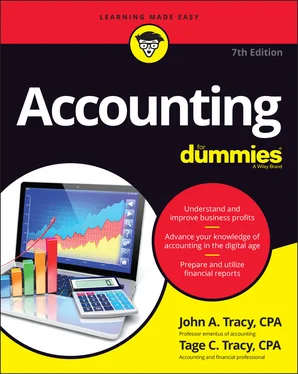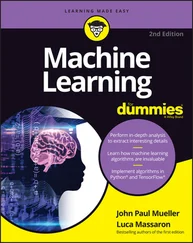John A. Tracy - Accounting For Dummies
Здесь есть возможность читать онлайн «John A. Tracy - Accounting For Dummies» — ознакомительный отрывок электронной книги совершенно бесплатно, а после прочтения отрывка купить полную версию. В некоторых случаях можно слушать аудио, скачать через торрент в формате fb2 и присутствует краткое содержание. Жанр: unrecognised, на английском языке. Описание произведения, (предисловие) а так же отзывы посетителей доступны на портале библиотеки ЛибКат.
- Название:Accounting For Dummies
- Автор:
- Жанр:
- Год:неизвестен
- ISBN:нет данных
- Рейтинг книги:3 / 5. Голосов: 1
-
Избранное:Добавить в избранное
- Отзывы:
-
Ваша оценка:
- 60
- 1
- 2
- 3
- 4
- 5
Accounting For Dummies: краткое содержание, описание и аннотация
Предлагаем к чтению аннотацию, описание, краткое содержание или предисловие (зависит от того, что написал сам автор книги «Accounting For Dummies»). Если вы не нашли необходимую информацию о книге — напишите в комментариях, мы постараемся отыскать её.
Accounting For Dummies
Accounting For Dummies — читать онлайн ознакомительный отрывок
Ниже представлен текст книги, разбитый по страницам. Система сохранения места последней прочитанной страницы, позволяет с удобством читать онлайн бесплатно книгу «Accounting For Dummies», без необходимости каждый раз заново искать на чём Вы остановились. Поставьте закладку, и сможете в любой момент перейти на страницу, на которой закончили чтение.
Интервал:
Закладка:
Typically, the accounting department is responsible for the following:
Payroll: The total wages and salaries earned by every employee every pay period, which are called gross wages or gross earnings, have to be calculated. Based on detailed private information in personnel files and earnings-to-date information, the correct amounts of income tax, Social Security tax, and several other deductions from gross wages have to be determined.Actually, a good deal of information has to be reported to employees each pay period, regarding withholdings and employee benefits. Retirement, vacation, sick pay, and other benefits earned by the employees have to be updated every pay period. Many employees do not get a payroll check. Instead, their money is sent electronically to the employee’s bank account. The total amounts of withheld income tax and Social Security taxes, plus the employment taxes imposed on the employer, have to be paid to federal and state government agencies on time.In short, payroll is a complex and critical function that the accounting department performs, often with the assistance of the human resource department. Note: Many businesses outsource payroll functions to companies that specialize in this area.
Cash receipts: All cash received from sales and from all other sources — whether via good old-fashioned cash or checks, credit cards, debit cards, electronic payments such as wire transfers or ACH, or other more modern payment vehicles such as PayPal — has to be carefully identified and recorded, not only in the cash account but also in the appropriate account for the source of the cash received. The accounting department makes sure that the cash is deposited in the appropriate checking accounts of the business and that an adequate amount of coin and currency is kept on hand for making change for customers. Accountants balance the checkbook of the business and control which persons have access to incoming cash receipts. (In larger organizations, the treasurer may be responsible for some of these cash-flow and cash-handling functions.)
Cash disbursements: A business writes many other checks or processes numerous electronic payments (such as Automated Clearing House or ACH payments, wire transfers, and so on) during the course of a year — to pay for a variety of purchases, to pay property taxes, to pay on loans, and to distribute some of its profit to the owners of the business, for example. The accounting department prepares all these checks for the signatures of the business officers who are authorized to sign checks. The accounting department keeps all the supporting business documents and files to know when the checks should be paid, makes sure that the amount to be paid is correct, and forwards the checks for signature. More and more businesses are switching to electronic methods of payments, which avoids the need for actually writing checks and mailing the checks. Electronic payments must be carefully protected to guard against hackers who would like to divert payments to themselves.
Procurement and inventory: Accounting departments usually are responsible for keeping track of all purchase orders that have been placed for inventory (products to be sold by the business) and all other assets and services that the business buys, from light bulbs to forklifts. A typical business makes many purchases during the course of a year, many of them on credit, which means that the items bought are received today but paid for later. So this area of responsibility includes keeping files on all liabilities that arise from purchases on credit so that cash payments can be processed on time. The accounting department also keeps detailed records on all products held for sale by the business and, when the products are sold, records the cost of the goods sold.
Costing: Costs are not as obvious as you might think. Tell someone that the cost of a new car is so many dollars, and most people accept the amount without question. Business owners and managers know better. Many decisions have to be made regarding which factors to include in the manufacturing cost of a product or in the purchase costs of products sold by retailers such as Costco and Walmart. Tracking costs is a major function of accounting in all businesses.
Property accounting: A typical business owns many different substantial long-term assets that go under the generic name property, plant, and equipment — including office furniture and equipment, retail display cabinets, computers, machinery and tools, vehicles (autos and trucks), buildings, and land. Except for relatively small-cost items, such as screwdrivers and pencil sharpeners, a business maintains detailed records of its property, both for controlling the use of the assets and for determining personal property and real estate taxes. The accounting department keeps these property records.
Tax compliance: The task of managing multiple tax accounting, reporting, and compliance functions usually falls on the shoulders of the accounting department. This extends well beyond simply completing annual income tax returns because most businesses must deal with a slew of other tax reporting and compliance matters, including sales/use, property, excise, payroll, and multiple other forms of taxation, at multiple levels including federal, state, county, local, and municipal.
Liabilities accounting: An entity must keep track of all relevant details about every liability it owes — from short-term purchases on credit to long-term notes payable. No entity can lose track of a liability and not pay it on time (or negotiate an extension) without hurting its credit rating.
 In most businesses and other entities, the accounting department is assigned other functions as well, but this list gives you a pretty clear idea of the back-office functions that the accounting department performs. Quite literally, a business could not operate if the accounting department did not do these functions efficiently and on time. And to repeat one point, to do these back-office functions well, the accounting department must design a good bookkeeping system and make sure that it’s complete, accurate, reliable, and timely.
In most businesses and other entities, the accounting department is assigned other functions as well, but this list gives you a pretty clear idea of the back-office functions that the accounting department performs. Quite literally, a business could not operate if the accounting department did not do these functions efficiently and on time. And to repeat one point, to do these back-office functions well, the accounting department must design a good bookkeeping system and make sure that it’s complete, accurate, reliable, and timely.
Focusing on Transactions
 The recordkeeping function of accounting focuses on transactions, which are economic exchanges between a business or other entity and the parties with which the entity interacts and makes deals. A good accounting system captures and records every transaction that takes place without missing a beat. Transactions are the lifeblood of every business, the heartbeat of activity that keeps it going. Understanding accounting, to a large extent, means understanding how accountants record the financial effects of transactions.
The recordkeeping function of accounting focuses on transactions, which are economic exchanges between a business or other entity and the parties with which the entity interacts and makes deals. A good accounting system captures and records every transaction that takes place without missing a beat. Transactions are the lifeblood of every business, the heartbeat of activity that keeps it going. Understanding accounting, to a large extent, means understanding how accountants record the financial effects of transactions.
The financial effects of many transactions are clear-cut and immediate. On the other hand, figuring out the financial effects of some transactions is puzzling and dependent on future developments. The financial effects of some transactions can be difficult to determine at the time of the original transaction because the outcome depends on future events that are difficult to predict. We bring up this point because most people seem to think that accounting for transactions is a cut-and-dried process. Frankly, recording some transactions is more in the nature of “let’s make our best assessment, cross our fingers, and wait and see what happens.” The point is that recording the financial effects of some transactions is tentative and conditional on future events.
Читать дальшеИнтервал:
Закладка:
Похожие книги на «Accounting For Dummies»
Представляем Вашему вниманию похожие книги на «Accounting For Dummies» списком для выбора. Мы отобрали схожую по названию и смыслу литературу в надежде предоставить читателям больше вариантов отыскать новые, интересные, ещё непрочитанные произведения.
Обсуждение, отзывы о книге «Accounting For Dummies» и просто собственные мнения читателей. Оставьте ваши комментарии, напишите, что Вы думаете о произведении, его смысле или главных героях. Укажите что конкретно понравилось, а что нет, и почему Вы так считаете.












